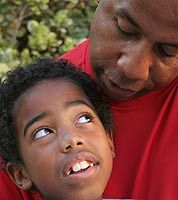In the summer of 2010, a retired Canadian couple from Nova Scotia won $11.2 million. Well into their 70s now, Allen and Violet Large decided to give away their fortune. So they made a two-page list of groups that ranged from churches to animal-protection agencies, from the local fire department to the Salvation Army. They made a sizable donation to the local hospital where Violet was being treated for cancer at the time of their windfall.
It wasn't that the Larges were already rich, mind you. Their home is modest. They drive a five-year-old truck. They appear to have clear values about what is worth most in life. "That money that we won was nothing," said Allen. "We have each other."Added Violet: "Money can't buy you health or happiness."
After putting about two percent of the money back in rainy-day fund, the Larges began making their distributions. And all the news reports I've seen of them either shows their smiling faces or quotes them about the pleasure they have received from being able to help others.
What about you? Ever play the fantasy game of what you would do with a million dollars? Or if you won a lottery jackpot? Or if some wealthy relative you didn't even know died and left her entire fortune to you? What came to mind?
Most guys would probably think of quitting work or buying a head-turning automobile. Then they might think of a town or island to buy for their privacy! Most women I've heard play the game immediately talk about providing for their children or building a dream house - or two.
More realistically, however, it might be worthwhile at this time of the year - when most of us are gathering our tax documents together - to review how we spend the customary and limited income we actually do have. A lot went to what we call "the basics," right? Rent or mortgage, utilities, groceries, insurance, and the like account for a significant percentage of spending. Then there may be bills for education or health issues beyond what is covered by insurance.
To view or order this related video online, go to: http://bit.ly/HLfAoyta
How does "charitable giving" shape up for you? The money for your church, community project, American Cancer Society, or the like? According to a "New York Times" article, average giving is about 4.2% for people making less than $25,000 per year - and 2.7% for those making north of $75,000. If your total or percentage seems small, just think about "Livin' Large" - a la Allen and Violet.
Is it more blessed to give than to receive? Their story seems to confirm it.
[The apostle Paul said,] "In everything I did, I showed you that by this kind of hard work we must help the weak, remembering the words the Lord Jesus himself said: 'It is more blessed to give than to receive'" (Acts 20:35 TNIV).











Comments
Have thoughts on this article? Leave a comment